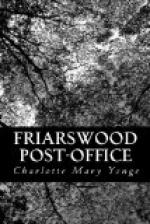‘Do you know who the fellow was?’ asked Mr. Carter.
‘Yes, I knowed him,’ said Harold, and stopped there.
‘But you had rather not tell. Is that it?’
‘Please, Sir, he’s gone, and I wouldn’t get him into trouble.’
At this the school-boys perfectly stamped, and made signs of cheering.
‘And who is the boy that came to help you?’
’Paul Blackthorn, Sir; he’s a boy from the Union who worked at Farmer Shepherd’s. He’s a right good boy, Sir; but he’s got no friends, nor no—nothing,’ said Harold, pausing ere he finished.
‘Why didn’t you bring him up with you?’ asked the master.
‘Please, Sir, he wouldn’t come.’
‘Well,’ said Mr. Carter, ’you’ve behaved like a brave fellow, and so has your friend; and here’s something in token of gratitude for the rescue of our property.’
It was a crown piece.
‘And here,’ said the boy whose watch had been saved, ’here’s half-a-crown. Shake hands, you’re a jolly fellow; and I’ll tell my uncle about you.’
Harold was a true Englishman, and of course his only answer could be, ‘Thank you, Sir, I only did my duty;’ and as the other boys, whose money had been rescued, brought forward more silver pledges of gratitude, he added, ’I’ll take it to Paul—thank you, Sir—thank you, Sir.’
‘That’s right; you must share, my lad,’ said the school-master. ’It is a reward for both of you.’
‘Thank you, Sir, it was my duty,’ repeated Harold, making his bow.
‘Sir, Sir, pray let us give him three cheers,’ burst out the head boy in an imploring voice.
Mr. Carter smiled and nodded; and there was such a hearty roaring and stamping, such ‘hip, hip, hurrah!’ bursting out again and again, that the windows clattered, and the room seemed fuller of noise than it could possibly hold. It is not quite certain that Mr. Carter did not halloo as loud as any of the boys.
Harold turned very red, and did not know which way to look while it was going on, nor what to do when it was over, except to say a very odd sort of ‘Thank you, Sir;’ but his heart leapt up with a kind of warm grateful feeling of liking towards those boys for going along with him so heartily; and the cheers gave a pleasure and glow that the coins never would have done, even had he thought them his own by right.
He was not particularly good in this; he had never felt the pinch of want, and was too young to care; and he did not happen to wish to buy anything in particular just then. A selfish or a covetous boy would not have felt as he did; but these were not his temptations. Knowing, as he did, that the assault had been the consequence of his foolish boasts about the money-letters, and that he, being in charge, ought to defend them to the last gasp, he was sure he deserved the very contrary from a reward, and never thought of the money belonging to any one but Paul, who had by his own free will come to the rescue, and saved the bag from robbery, himself from injury and disgrace.




